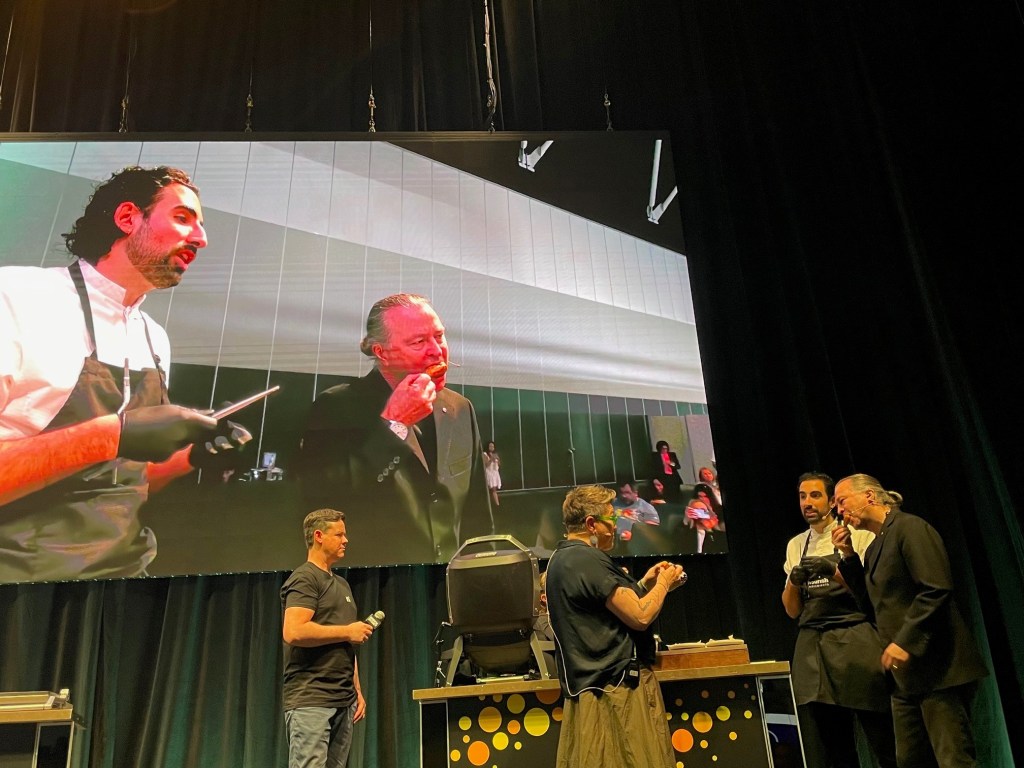Chef Neil Perry tasted food-tech startup Nourish Ingredients’ first product – a vegan animal fat made with precision fermentation – unveiled at SXSW Sydney yesterday.

Using off-the-shelf plant-based proteins for yesterday’s tasting, Nourish Ingredients chef Ernesto Vecilla, added its key intellectual property – precision fermented animal fat analogues which it is calling Tastilux – to give the “chicken wing” the fat-is-flavour oomph needed to perhaps succeed where plant-based meats have, to date, failed.
“It’s got a pull to it, like pulling a chicken drumstick apart,” Perry said, tasting the product for the first time on the SXSW stage, chewing a morsel that looked like a chicken piece, with a soy-based “skin”, gluten-based flesh, and an edible “bone” made from calcium and the sweetener Mannitol. But it was the fat we were there to check out.
“Texturally, you get … all that you expect from a piece of chicken, even the bone, and you also get the really nice mouth feel of the fat coming around and inducing the flavour of the chicken,” Perry said. “So you get the double whammy on the fat and texture.”
Nourish Ingredients, which made the Forbes Australia list of 15 top capital raisings for the last financial year with a US$28 million injection, was founded by former CSIRO lipid engineers Dr James Petrie and Dr Ben Leita in 2019.

Tastilux comprised just 0.5% of the drumstick by weight. But that 1/200th of the total meal comprised some key animal fats that, when cooked, caramelize and provide the meaty flavours, Vecilla told Forbes Australia, at a private tasting.
Founder and CEO Petrie said that the small portion was all that was needed to create the crucial flavours.
Petrie left the CSIRO after helping create a canola plant that was genetically modified to produce long-chain omega 3 fatty acids to mimic the more healthy fat profile of fish oil.
“One of the real drawbacks in this whole plant-protein push that we’ve seen over the last few years is that the emphasis has been on the protein, but very few people have been working on the fats,” Petrie said. “We thought there must be something that we could do to make these foods authentic and to bring in that real taste and aroma experience that you get out of an animal product.”
Nourish Ingredients is currently at 55 employees with a pilot plant in Singapore and hoping to be selling product by next year. It has raised more than $50 million over three funding rounds, each co-led by Main Sequence and Hong Kong-based Horizons Ventures. It will be going out for an as yet unannounced Series B next year, Petrie said.
Precision fermentation works by splicing the gene for a molecule into a micro-organism and then brewing vast numbers of that micro-organism to produce the desired molecule at scale. It is the way insulin has been made for years.
But it wasn’t quite that straight forward for Nourish Ingredients.
“Everyone says the flavour is in the fat, right? But we didn’t actually know what part of the fat had the flavour,” Petrie said. “So the first exercise we did was to look at a whole bunch of uncooked animal products – pork, beef, chicken, lamb. We did what you could think of as molecular dissection … What we found is that 90% of the fats in there are pretty boring. They don’t contribute to that animalic, meaty tone. And they’re also chemically the same type of fat that you see in plants. A lot of them could just as easily be replaced by canola or soya or palm oil. But around 10% of the fats present in all of these meats are very different, and these are the ones that, when you cook them, they take part in that Maillard reaction, that browning, caramelising reaction when you roast a bit of meat and it converts into this wonderful, rich diversity of aroma and taste molecules.”
The traditional way a flavour company would look at these tastes would be to replicate the fat molecules from that cooked piece of meat. “We went in the other direction and went back to the uncooked piece of meat. And we are now adding in what you can think of as a pre-flavour, which is the original starting point – animal-type fat.
“It’s almost like cheating, I reckon, because when you add it in at the beginning of the cooking process, it participates in that Maillard reaction that occurs when you cook meat. And it gives rise to the legit, authentic meat taste and aroma molecules. We’re not trying to simulate them. We’re actually putting the real deal in at the beginning.”
“What we’re doing is adding in just a small component [of the meat fat analogue] which is critically important for authentic taste.”
Nourish Ingredient’s business model will be to sell their fat as an ingredient to food manufacturers. They will not have their own product on supermarket shelves.

Tastilux is Nourish’s most advanced product but it is also working on fats for dairy products that are intended to work with precision fermented dairy proteins, and “alternative milks” like soy, to give them a more authentic cream flavour.
Petrie tasted the first iteration of their product during COVID lockdowns. “I received this Esky from the team. I unpacked it and it was this nasty brown sludge. That’s the only way I could describe it. And I thought, ‘What are we doing here? Wasted how many millions of invested dollars?’ But when I put it onto the piece of TVP [vegetable protein] threw it on the pan and it started going golden brown – the typical frying reaction – and I started to smell that legit aroma. ‘Okay, there’s something interesting going on on that pan.’ And when I tasted it, it was a revelation because the theory is all well and good. But as a scientist it’s always nice when the reality mirrors the theory.
He shared a taste with his son who loves his meat. “Oh, that’s really good. Dad, you could sell that.”
Tastilux is awaiting regulatory approval and Nourish Ingredients faces scaling problems in getting enough fermentation facilities to produce the product, but Petrie says he is hopeful they will achieve first sales next year.



